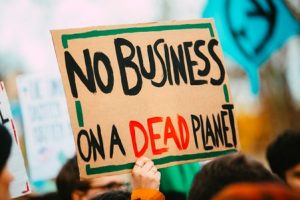When IPCC report means business

On 9th Aug 2021, the Intergovernmental Panel on Climate Change (IPCC), the UN agency responsible for assessing climate change, released their sixth report which predicted, with high confidence, that global warming will indeed exceed the 1.5°C (2.7°F) Paris targets, maybe even as early as 2030.
In case you aren’t aware, we are already experiencing the symptoms of it – from unprecedented floods happening in Europe and China over the summer, to extensive forest fires in Turkey. So how does this report impact businesses?
For many, 1.5°C is a small number – and not an alarming one, especially for us living in SEA who don’t usually enjoy winters. But it is, because of the environmental changes triggered by the slight temperature increase which will likely show up in many more record-breaking catastrophic events. Climate change used to be a distant and seemingly irrelevant business issue, but it now presents urgent and material risks. Businesses globally such as Google and Amazon are committing to net-zero carbon emissions, so what does this mean for SMEs?
Industry observers noted that businesses, whether large or small, with sustainable practices, stand to benefit from, not only a better reputation but also cost reductions through improved efficiency, while better managing business risk among other things. On the other hand, those without may soon find it harder to access certain sources of funding where investors are placing greater importance on Environmental, Social, Governance (ESG) factors. They may be unprepared to face increasingly frequent and greater disruptions in their supply-chain processes and rising prices of energy or raw materials while missing out on opportunities to build up their brand reputation to attract Gen Y consumers and workers – where more than two-thirds want their employers to be environmentally friendly. It’s not only about ESG, but also about how much not considering the climate risk increases the general risks of any investment. As business leaders, one should always aim to stay ahead in the game, rather than responding only when one faces the issue – which in this case, will very likely arrive sooner than later.
Singapore is already beginning to see a greater push through nationwide plans and new laws that encourage and/or enforce sustainable practices within business operations. This includes the carbon tax launched in 2019 to reduce Greenhouse Gas (GHG) emissions, the recently launched Singapore Green Plan 2030 which introduced initiatives to green the economy such as encouraging green procurement and introducing green and sustainability-linked loans (through the Monetary Authority of Singapore) and the Resource Sustainability Act, launched in 2020 to reduce waste and packaging use.
So, if you’re a business leader or employee, where do we begin to incorporate such perspectives?
It may seem like a daunting task since climate change and sustainability seem to affect almost every aspect of our business operations. But fear not, as here are some resources below to start you out on your journey, in which your efforts will definitely not go to waste!
The UN-supported initiative aims to engage businesses, especially small and medium businesses, in meeting reduction targets.
Singapore’s whole-of-nation movement to advance Singapore’s national agenda on sustainable development with the long-term aim of achieving net-zero emissions.
3. UN SDGs
A UN framework with 17 goals, taken as a global call to action to protect the planet and end poverty by 2030.
A WWF beginner’s guide and toolkit to navigate the different elements of emissions reporting and decarbonization.


